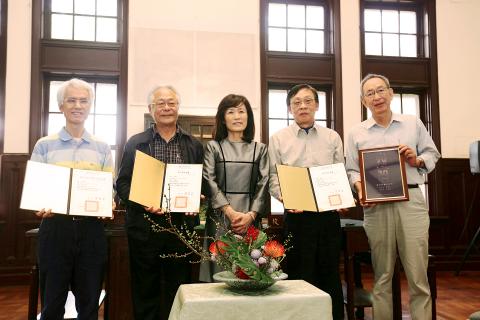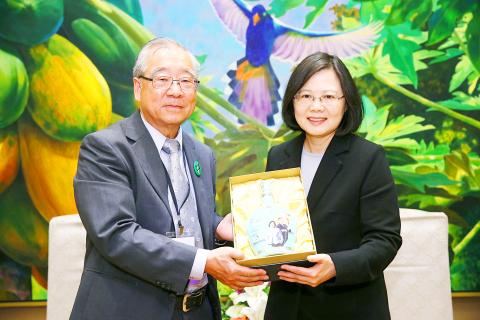President Tsai Ing-wen (蔡英文) yesterday said that the government would take the lead in investigating the 228 Incident and find those accountable for the tragic chapter in the nation’s history.
The government will investigate the Incident, present the truth and pursue those who are accountable to remedy the current status of “only victims, but no perpetrators,” the president said.
“We will not forget [the mission], nor will we circumvent it,” she said.

Photo: CNA
Tsai said she wants to let society reflect more deeply on the mistakes of the Incident, learn from it and move toward reconciliation to create a “democratic, just and united nation.”
The 228 Incident was triggered by a clash between government officials and an illegal cigarette vendor on Feb. 27, 1947. The event turned into an anti-government uprising and was violently put down by the then-Chinese Nationalist Party (KMT) regime.
An estimated 18,000 to 28,000 people were killed during the crackdown, which lasted for several weeks into early May that year, according to an investigation commissioned by the Executive Yuan in 1992.

Photo: CNA
Tsai made the remarks while receiving an overseas group consisting of family members of some of the victims, who were accompanied by Overseas Community Affairs Council Deputy Minister Tien Chiu-chin (田秋蓳), in a closed-door meeting.
“I will instruct related government agencies to continue to sort the files from the authoritarian era, so that the truth that has been kept in the dark for 70 years will come to light,” the president said.
In her address to the group, Tsai was quoted in a news release as saying that this year marks the 70th anniversary of the Incident, adding that Taiwan lost almost a whole generation of its elite due to the mistakes committed by the authoritarian rulers of the time.
“Even today, Taiwanese are still suffering from the consequences of the 228 Incident,” she said.
After Taiwan became democratic, people were finally able to openly discuss the Incident, she said.
The government has admitted mistakes, apologized, set up monuments and has probed the truth. It has also rehabilitated the names of victims and compensated their families in a bid to heal the trauma.
However, the president said she knows clearly that for the families of the victims, the government’s work is far from complete.
“We should not forget history, nor our trauma,” she said.
She said that she attended a Holocaust Remembrance Day activity in Taipei on Sunday and acutely felt the courage of Germany in facing its historical mistakes.
She pointed out that the German government, academics and the private sector have continued to probe the historical facts in a bid to more carefully dig out the truth and have continued to prosecute Nazi war criminals.
Germany’s experience is inspirational to Taiwan, she said, adding that the pursuit of historical truth and the preservation of history are long-term social goals.
The government has an obligation to continue to more thoroughly probe the truth of the Incident in an open and transparent manner so that the accountability of those responsible can be more clear and detailed, she said.
Among the files collected by the Archive Bureau, only a few have yet to be declassified, Tsai said.
She said that as far as she knows, four files belong to the Overseas Community Affairs Council, which is coordinating the process “to declassify them as soon as possible.”

SECURITY: As China is ‘reshaping’ Hong Kong’s population, Taiwan must raise the eligibility threshold for applications from Hong Kongers, Chiu Chui-cheng said When Hong Kong and Macau citizens apply for residency in Taiwan, it would be under a new category that includes a “national security observation period,” Mainland Affairs Council (MAC) Minister Chiu Chui-cheng (邱垂正) said yesterday. President William Lai (賴清德) on March 13 announced 17 strategies to counter China’s aggression toward Taiwan, including incorporating national security considerations into the review process for residency applications from Hong Kong and Macau citizens. The situation in Hong Kong is constantly changing, Chiu said to media yesterday on the sidelines of the Taipei Technology Run hosted by the Taipei Neihu Technology Park Development Association. With

CARROT AND STICK: While unrelenting in its military threats, China attracted nearly 40,000 Taiwanese to over 400 business events last year Nearly 40,000 Taiwanese last year joined industry events in China, such as conferences and trade fairs, supported by the Chinese government, a study showed yesterday, as Beijing ramps up a charm offensive toward Taipei alongside military pressure. China has long taken a carrot-and-stick approach to Taiwan, threatening it with the prospect of military action while reaching out to those it believes are amenable to Beijing’s point of view. Taiwanese security officials are wary of what they see as Beijing’s influence campaigns to sway public opinion after Taipei and Beijing gradually resumed travel links halted by the COVID-19 pandemic, but the scale of

A US Marine Corps regiment equipped with Naval Strike Missiles (NSM) is set to participate in the upcoming Balikatan 25 exercise in the Luzon Strait, marking the system’s first-ever deployment in the Philippines. US and Philippine officials have separately confirmed that the Navy Marine Expeditionary Ship Interdiction System (NMESIS) — the mobile launch platform for the Naval Strike Missile — would take part in the joint exercise. The missiles are being deployed to “a strategic first island chain chokepoint” in the waters between Taiwan proper and the Philippines, US-based Naval News reported. “The Luzon Strait and Bashi Channel represent a critical access

Pope Francis is be laid to rest on Saturday after lying in state for three days in St Peter’s Basilica, where the faithful are expected to flock to pay their respects to history’s first Latin American pontiff. The cardinals met yesterday in the Vatican’s synod hall to chart the next steps before a conclave begins to choose Francis’ successor, as condolences poured in from around the world. According to current norms, the conclave must begin between May 5 and 10. The cardinals set the funeral for Saturday at 10am in St Peter’s Square, to be celebrated by the dean of the College